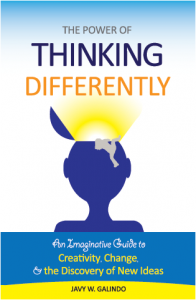Chapter 1 excerpt from The Power of Thinking Differently by Javy W. Galindo
From section entitled “The Problem of Over Exaggerated Seriousness” (updated 1/18/09 from draft IIII)
—
In many ways, our inability to access multiple perspectives can be interpreted as caused by a state of exaggerated seriousness. The word seriousness usually carries with it the connotation of significance. When we say we take something seriously we usually are referring to its importance to us. What ends up happening though is that we become drawn into the gravity of our initial, literal perception of what it is we are serious about.
Like the earth pulling an apple down from an apple tree, seriousness tends to pull our perceptions down to a particular, narrow perspective. We end up with our face so close to a window that all we see is our reflection rather than the depth of reality behind it. Or, like a novice stock trader, our attention is drawn so close to a stock chart that we notice the one day trend and neglect the breadth of the larger pattern.
(image)
This is what happens with an over-exaggerated seriousness. We lose perspective, and our perceptions of what are possible shrink. Seriousness then involves not just holding something important, but holding a particular perception of it as important.
A prime example of this is our sense of self. Taking ourselves too seriously really refers to maintaining a particular story of ourselves as important. When others challenge this story, or when the world seems to reject it, we can get offended, angered, and frustrated. If we continue to take ourselves too seriously we, never see ourselves as anything other than our story. We fail to see how much more we are and how much more we can be. We fail to grow, learn, and see all the possibilities for our lives because we are stuck trying to prove to the world we are who we say we are. But, if our stories are who we really are, why do we constantly feel the need to prove them to others?
The truth is that we can be concerned with our own well being without needing to protect the story we have of ourselves.
This is how an exaggerated seriousness is like gravity drawing us into a literal, surface, and face value perception of things. We end up with our nose so close to this perception that we are unable to see anything else. Our world is narrowed down to an incomprehensible single puzzle piece because we are unable to stand back and view the bigger picture. A sense of humor simply means that we not be dragged down by the weight of our literal perceptions. It means taking ones perceptions “lightly” enough that we are able to see other views. By freeing ourselves of the need to maintain a particular perception we become open to the multiplicity, depth, and breadth of reality – we gain access to more creative possibilities.
Cultivating a sense of humor cultivates the ability to find and hold multiple meanings and multiple perspectives. When we find something to be funny, we are simply re-interpreting information in a context different than the dominant one. For instance, to be able to laugh at ourselves, or at our predicaments, is then the ability to let go of more permanent notions of self-identity and personal conditions in order to discover different ones, usually in a deeper, wider, and less personal context. This can open the door to new possibilities, new solutions, and alternative directions in which to take our lives. The same is true of any endeavor where we choose to think differently.
But as I said before, we must first be willing to accept that an alternative view or idea may be possible. We must allow ourselves to have the freedom to believe that our particular perceptions may not be the only ones. We must be less serious about our own ideas in order to get beyond our dominant modes of thought, our sense of reason, so that we can think differently. By having a lighthearted approach to life, we can allow ourselves to take on shifts in perspective in order to attain those aha moments of insight that are often the hallmark of the creative process.
Often this dichotomy between common reason and creative thought is referred to as a left vs. right brain distinction. But we’ll see that this is a gross overstatement that leaves many without the ability to create anything at all. Rather, what is needed is cooperation between the two modes of thinking. It is only through such cooperation that we are able to tackle problems that we haven’t faced before, such as the man in the hospital. Otherwise, we’ll be lost wandering around with tons of interesting ideas, but never being able to turn any of them into a tangible reality. We would be stuck chasing dreams, but never able to manifest them in our waking lives; able to access multiple interpretations of a setup, but never really able to get the humor out of a punch line.
—-
Please leave a commment, question, or suggestion below.
You may also be interested in reading the previous section entitled: Beyond Common Sense and Towards a Sense of Humor.


